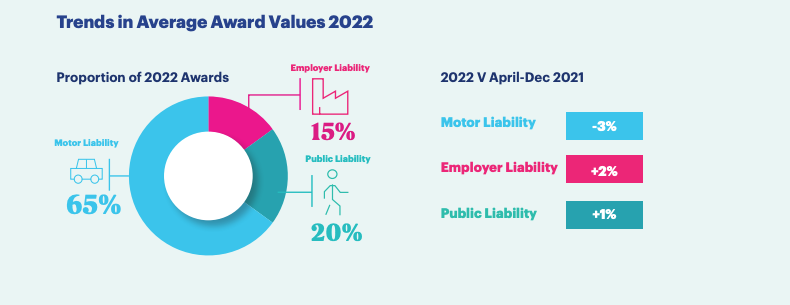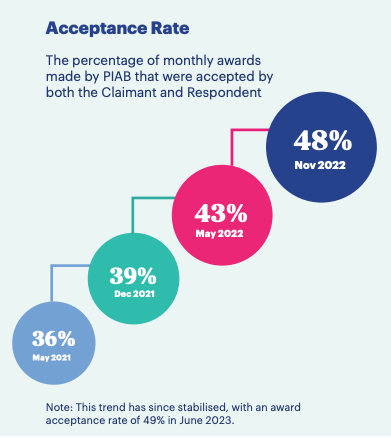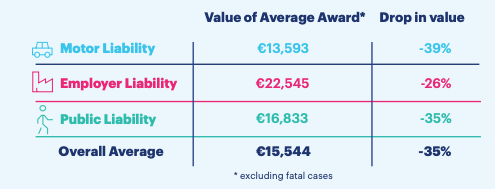Personal Injury Assessment Board (PIAB) Becomes PIRB — What Does That Mean for Your Claim?
The law is a living thing, constantly evolving and adapting in response to changing times, circumstances and requirements. That’s why new legislation was recently introduced to update the Personal Injury Assessment Board (PIAB), familiar to most of us as “the Government body which resolves personal injuries claims”. One of the biggest changes is to its name: it’s now known as the Injuries Resolution Board or Personal Injury Resolution Board (PIRB).
PIRB is a busy place: in 2022, it oversaw almost 18,500 claims, including those arising from motor, workplace and personal injuries, as well as public liability and Garda compensation. Motor liability (usually related to road traffic accidents) makes up the majority of the claims, at 65%. This is followed by public liability at 20% and employer liability at 15%.

What is the purpose of the Personal Injury Resolution Board?
PIAB (now PIRB) was originally established in 2004 to “support the fair, prompt, and transparent resolution of personal injuries claims without the need for unnecessary litigation”. The idea was and is to reduce the expense of processing and litigating claims, saving “millions of euro…which would otherwise be spent on processing claims, leading to higher costs for policy-holders.”
PIRB fees are fixed and relatively low. The process usually involves delivering all the information to PIRB, after which they will review the claim and make a recommendation on any compensation. In most circumstances, a Claimant will then have two choices:
- You and the party at fault both accept the settlement amount recommended by PIRB. The party at fault is then ordered to pay this amount to you.
- Either you or the party at fault does not accept the suggested settlement amount. You would likely then move to issue court proceedings against the person at fault for your accident/injury.

Whether you agree to the PIRB recommendations or want a court to decide is entirely up to you, although most Claimants will rely heavily on the advice of experienced personal injury solicitors in Ireland.
The PIRB recommendation acceptance rate is currently about 50/50, as evidenced by recent data on the percentage of monthly awards made by PIRB that were accepted by both the Claimant and Respondent.
This means that some 9,000 claims that would otherwise have been processed in a lengthy, costly and uncertain court process were instead settled relatively quickly, affordably and easily by PIRB.
However, the downside to this is that the award value may not be sufficient to meet the Claimant’s injury-related costs, which can be extensive. Wondering what is the average PIRB award? The figures tend to vary wildly due to the many differences in terms of accidents and injuries, but the below will give some indication of 2022’s average awards.

It is for this reason that about half of all Claimants still prefer to bring a personal injury claim through the courts, with the help of seasoned solicitors.
Why did Personal Injury Assessment Board change to Personal Injury Resolution Board?
Legislation was recently introduced to strengthen and enhance PIRB’s framework in an effort to increase the amount of cases resolved through PIRB instead of the courts, which will cut the expense and time associated with personal injury litigation and “ultimately reduce the costs of claims for consumers and businesses”.
Part of the Government’s ‘Action Plan for Insurance Reform’, this legislation aims to “facilitate reductions in insurance premiums while ensuring that claims are efficiently and successfully resolved for those deserving”.
The Personal Injuries Resolution Board Act 2022 (PIRB Act 2022) amends the PIAB Act 2003-2019 and brought with it a raft of changes.
What do the changes involve?
PIRB is a big organisation, handling thousands of complex cases every year. In order to make the transition smooth for all stakeholders, the changes have been broken into three phases.
Phase one
The first tranche of changes came into effect on the 13th February last year, bringing with them some practical shifts:
- PIRB now has additional time to assess claims where an injury is yet to settle rather than issuing Authorisations to allow Claimants to proceed to litigation.
- PIRB will also have the ability to assess claims of a wholly psychological nature.
- It will be an offence to supply false information to PIRB and PIRB is empowered to disclose information to An Garda Síochána.
Phase two
Kicking off on the 4th September 2023, this phase included some more detailed changes, which affect in particular how much time a person has to lodge a claim with PIRB:
- It is now a requirement to supply a Personal Public Service Number (PPSN) or alternative identification, when making an application to PIRB.
- All Claimants are now required to sign the application form.
- Failure to supply the required information listed in Sections 3(b) and 3(c) of the PIRB Act 2022 regarding an application to PIRB, including description in the medical report of the personal injuries allegedly sustained, will result in the statute of limitations continuing to run and the PIRB application will be incomplete.
Phase three
The final phase of the PIRB Act came into effect on the 14th December 2023 and involved two big changes:
- PIAB has been renamed the Injuries Resolution Board (known as PIRB), to reflect the expansion of its role.
- Mediation is now to be offered as a new service to resolve personal injury claims. Initially, mediation will only be available for employer liability claims with public and motor liability claims to follow later in 2024.
What is the IRB mediation service?
This last change — the introduction of a mediation option — could potentially have a big effect on the personal injury litigation landscape.
Modelled on the Mediation Act 2017, participation in the process is entirely voluntary, with each party free to withdraw at any time prior to its completion. The mediator will be a Board staff member or an external appointment; he or she will be tasked with hearing both sides throughout the mediation and preparing a report for submission to the Board.
If the parties reach an agreement, there is a kind of ‘cooling-off’ period; each party will have the option to withdraw from that agreement provided they inform the mediator and the Board within ten days. If they are happy to proceed with the mediation, the Board will issue an order for the payment of the monetary value agreed.
If the parties were unable to reach an agreement through mediation, the Board will refer the claim onward for assessment (unless a respondent does not consent to an assessment of the claim).
While it might seem like mediation could delay the resolution process, this is not the intention; cases will still need to be resolved within the nine-month statutory time limit. It could, however, save everyone a lot of time and money if agreement can be reached in the first instance, without the need for assessment or indeed litigation.

The Injuries Resolution Board lists the following main benefits of mediation:
- It’s independent, impartial and quick, with resolution expected in less than three months
- It allows you to fully talk about a broad range of issues
- It’s confidential, with both parties signing agreements to this effect
- Neither party ever has to speak directly to each other
- It’s voluntary, but all agreements are legally binding
- If no agreement is reached, it doesn’t affect your legal rights
Legislation must be tested in order to assess its efficacy, which is why there is a mechanism for reviewing the PIRB Act 2022. The Minister of State in the Department of Enterprise, Trade and Employment is obliged to review the operation of the amendments within 18 months of the commencement of any particular section, and then to report on that review within 12 months.
The Law Society of Ireland had expressed concerns surrounding the legislation, elements of which they believe “may be open to interpretation and challenge”. They held meetings with both PIRB in May 2023 and with Minister Calleary in July 2023 to highlight those concerns, but there are currently no proposed alterations in place. It remains to be seen how effective the PIRB Act 2022 will be in reality.
How will these changes affect me?
If you’re thinking of making a personal injury claim in Ireland, it’s important that you are fully informed of the new framework, and understand how it works. While some changes won’t affect you much (such as the name change) others could result in your claim being rejected as incomplete (such as the need for extra information).
Dedicated personal injury solicitors like HOMS Assist have long been prepared for these new rules, and will ensure that the changeover is seamless. They will adjust your file, add the new information, and offer general advice and guidance on the option of mediation. Every injury, accident and circumstance is different, so it’s vital you get professional help with a PIRB application, particularly for more complex cases involving serious injuries and long-term repercussions.
If you’d like to speak to a qualified personal injury solicitor in confidence, get in touch with our dedicated team today. Based in Limerick, Dublin and Cork, the team includes experts in the field who have successfully achieved resolution for people who have suffered accident, illness or injury of all kinds. They are there to provide you with dedicated support and up-to-date advice.









